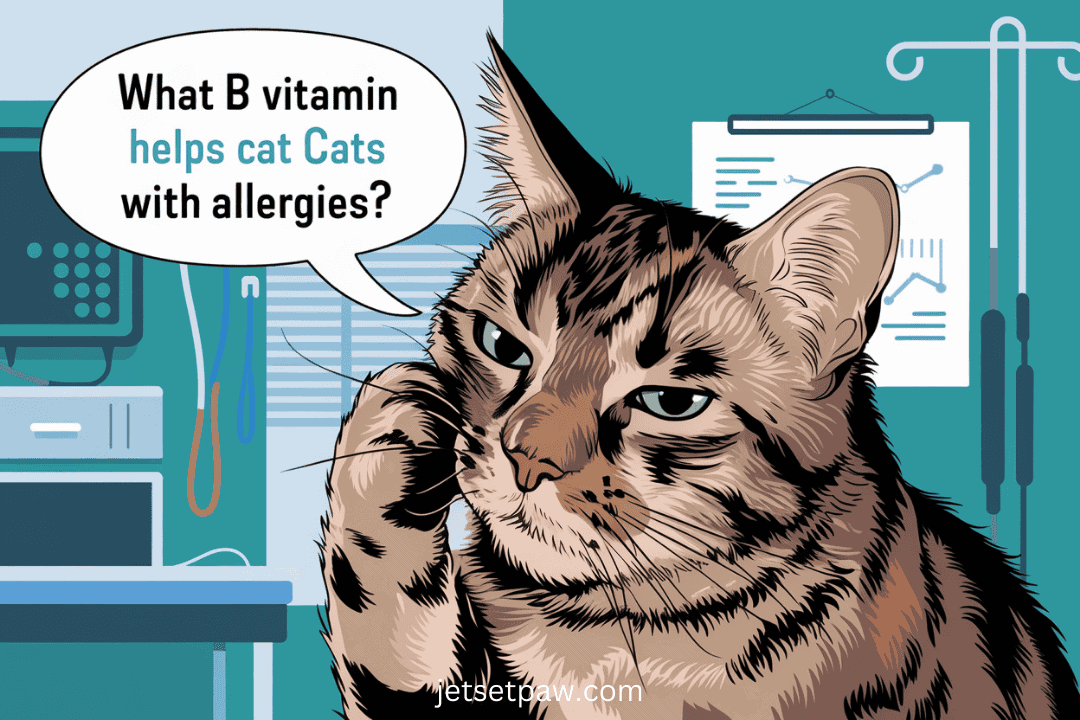Cats, just like humans, can suffer from allergies. These allergies can make our feline friends uncomfortable, causing symptoms like itchy skin, sneezing, or digestive issues.
Cat owners need to understand how to help their pets when allergies strike. One way to support cats with allergies is proper nutrition, especially concerning B vitamins.
B vitamins play a crucial role in a cat’s overall health. These vitamins help with everything from energy production to healthy skin and fur.
Certain B vitamins can be particularly beneficial for cats with allergies. They can help strengthen the immune system and improve the condition of a cat’s skin and coat.
Among the various B vitamins, one stands out when helping cats with allergies. This unique B vitamin can make a real difference in managing allergy symptoms and improving your cat’s quality of life.
Keep reading to discover which B vitamin is the secret weapon against cat allergies and how it can help your furry friend feel better.
Understanding Cat Allergies
Cats can develop allergies to various things in their environment or diet. Some common types of allergies in cats include food allergies, flea allergies, and environmental allergies.
Food allergies often occur when cats react to certain proteins in their diet. Flea allergies happen when cats are extra sensitive to flea bites. Things like pollen, dust, or certain plants can cause environmental allergies.
When a cat has allergies, they might show different symptoms. These can include excessive scratching or grooming, red or irritated skin, hair loss, and ear infections.
Some cats might sneeze more often or have watery eyes. In some cases, cats with allergies might also have digestive issues like vomiting or diarrhea.
Allergies can seriously affect a cat’s health and happiness. Constant itching and scratching can lead to skin infections.
Allergies can also make cats feel uncomfortable and stressed, which might change their behavior or appetite.
If left untreated, allergies can weaken a cat’s immune system, making them more likely to get sick from other things.
That’s why it’s essential to address allergy symptoms and find ways to help cats feel better, such as using the right B vitamins.
B Vitamins and Their Role in Cat Health
B vitamins are a group of essential nutrients that help keep cats healthy. These vitamins are water-soluble, which means they dissolve in water and aren’t stored in the body for long periods.
Because of this, cats need a regular supply of B vitamins in their diet to stay healthy.
Cats need B vitamins for many critical bodily functions. These vitamins help turn food into energy, keep the nervous system working correctly, and maintain healthy skin and fur.
B vitamins also play a role in making red blood cells and keeping the immune system strong. Without enough B vitamins, cats might become tired, lose their appetite, or develop skin problems.
There are several types of B vitamins, each with its job in the body. Some of the main B vitamins important for cats include:
- Thiamine (B1): Helps with energy production and brain function
- Riboflavin (B2): Important for growth and red blood cell production
- Niacin (B3): Helps with digestion and keeping skin healthy
- Pyridoxine (B6): Involved in making proteins and hormones
- Cobalamin (B12): Necessary for nerve function and making DNA
- Biotin (B7): Crucial for healthy skin, coat, and claws
Each of these B vitamins contributes to a cat’s overall health, but one B vitamin stands out as particularly helpful for allergies. We’ll explore that special B vitamin in the next section.
The B Vitamin That Helps with Cat Allergies
Vitamin B7, also known as Biotin, is the special B vitamin that can help cats with allergies. Biotin is sometimes called the “beauty vitamin” because it’s so good for skin and hair health. For cats with allergies, Biotin can be a real game-changer.
Biotin helps with allergies in a few crucial ways. First, it strengthens the skin barrier, the body’s first defense against allergens. A stronger skin barrier means fewer allergens can get through and cause problems.
Biotin also helps reduce inflammation in the body. Less inflammation means less itching and irritation for cats with allergies.
The benefits of Biotin for cats go beyond just helping with allergies. It’s great for overall skin and coat health. Biotin helps cats grow a shiny, healthy coat and strong claws.
It can also help heal skin that’s been damaged by excessive scratching due to allergies. Some cat owners report that their pets shed less when they get enough Biotin.
Biotin can make a big difference for cats with dry, flaky skin or dull, brittle fur. It helps the body produce keratin, an essential protein for healthy skin and hair.
With enough Biotin, many cats experience softer skin and a more lustrous coat. This can help them feel comfortable and look their best, even when dealing with allergies.
How to Give Your Cat Biotin
There are several ways to make sure your cat gets enough Biotin. Some foods naturally contain Biotin, which is great news for cat owners. Egg yolks, liver, and some types of fish are good sources of Biotin.
Many commercial cat foods also include Biotin, so check the label to see if it’s already in your cat’s regular diet.
Supplements might be a good option if your cat needs more Biotin than they’re getting from food. Biotin supplements come in different forms, like pills, liquids, or powders that you can mix into your cat’s food.
The right amount of Biotin for your cat depends on their size, age, and health needs. Most cats do well with 5 to 25 micrograms of Biotin daily, but it’s important not to guess.
Before starting any new supplement, it’s always best to talk to your veterinarian. They can help you determine if your cat needs extra Biotin and how much is safe to give.
Your vet can also check for other health issues that might be causing skin problems or allergies. They might even suggest blood tests to see if your cat lacks Biotin or other essential nutrients.
Remember, every cat is different, so what works for one might not be right for another. Your vet’s advice will help keep your cat healthy and happy.
Other Ways to Help Cats with Allergies
Helping cats with allergies isn’t just about Biotin. There are other things you can do to make your cat more comfortable.
Environmental changes can make a big difference. Keep your home clean by vacuuming often and washing your cat’s bedding regularly. This helps reduce allergens like dust and pollen. Use air purifiers to clean the air in your home.
Also, keep your cat away from things that might trigger allergies, like certain plants or cleaning products.
Changing your cat’s diet can also help with allergies. Some cats are allergic to certain ingredients in their food. Talk to your vet about trying a hypoallergenic diet or food with limited ingredients.
This can help you figure out what your cat might be allergic to. Sometimes, adding omega-3 fatty acids to your cat’s diet can help reduce inflammation and improve skin health.
Regular grooming is essential for cats with allergies. Brushing your cat often helps remove allergens from its fur and skin.
It also spreads natural oils through its coat, keeping its skin healthy. If your cat allows it, giving it occasional baths with a gentle, cat-friendly shampoo can help wash away allergens. Be careful not to bathe them too often, which can dry their skin.
Remember, these changes work best with other treatments like Biotin supplements. Always check with your vet before changing your cat’s routine or diet.
With patience and care, you can help your cat feel much better and enjoy life without the discomfort of allergies.
Conclusion
Biotin, or Vitamin B7, can be very helpful for cats with allergies. It strengthens their skin, keeping allergens out. It also helps reduce inflammation and makes their coat healthier. This means less itching and a happier cat.
But remember, Biotin is just one part of helping your cat with allergies. It’s important to look at the whole picture. This means thinking about your cat’s environment, what it eats, and how you take care of it.
Cleaning your home, changing its food, and grooming it regularly can all help, too. When you combine all these approaches, you give your cat the best chance at feeling better.
If your cat might benefit from Biotin or other B vitamins, talking to your vet is a good idea. They know your cat’s health history and can advise you.
Your vet can help you determine the right amount of Biotin for your cat and ensure it’s safe to use. They might also have other ideas to help your cat feel better.
Don’t be afraid to ask questions and work with your vet to find the best plan for your furry friend. Proper care lets your cat be more comfortable and enjoy life without allergies.

